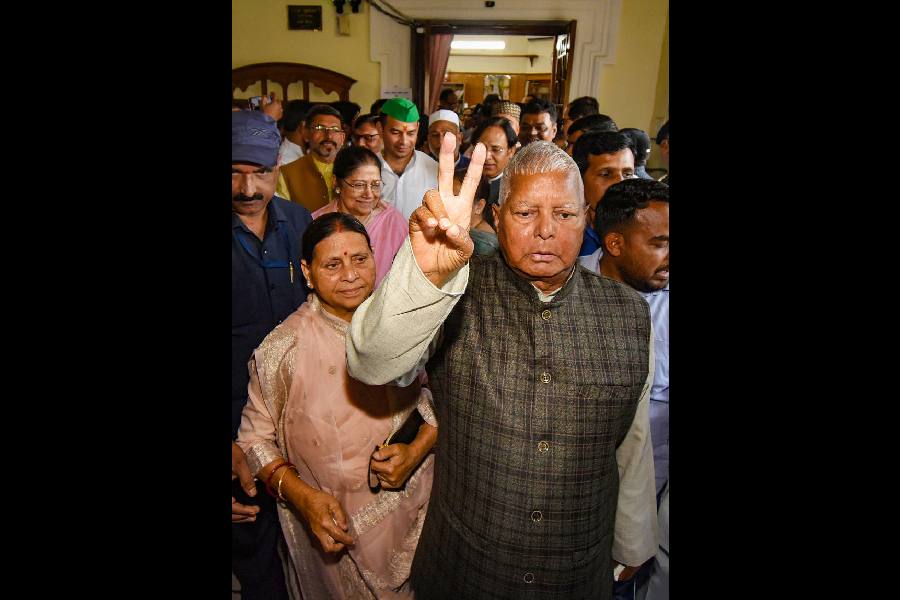Bihar has 40 Lok Sabha seats but the combined demands of the NDA constituents amount to 50 seats, which has made the process of seat-sharing difficult for the BJP.
Sources said that the situation has come to a head and the bigger parties in the alliance, including the BJP and chief minister Nitish Kumar’s JDU, are considering sacrificing a couple of seats to balance the numbers and keep the NDA flock united, especially when the Opposition is trying to lure them.
The thought is gaining importance because any upset in Bihar, which ranks fourth after Uttar Pradesh (80), Maharashtra (48), and Bengal (42) in terms of the number of Lok Sabha seats, can have severe repercussions on the overall results, as well as, long-term goals of the BJP, especially in the light of its slogan of abki baar, 400 paar (win over 400 seats this time).
“We are facing a problem of plenty — plenty of political parties and (their) plenty of demands. But the time and seats are limited. Add to that ego clashes and emotions. To juggle and distribute seats in this situation is an uphill task and we are trying our best,” a senior BJP leader told The Telegraph on the condition of anonymity.
The issue has now reached the top BJP leaders in Delhi, and they are trying hard to resolve it by the time the election dates are announced. The JDU leaders are also brainstorming on the situation.
“Forget about the seats we won or the seats we contested last time. The main objective is to stay together and win all the Lok Sabha seats in the state. Neither the BJP nor we are rigid about seat sharing. Everything will be sorted out amicably,” a top JDU leader and close aide of Nitish Kumar told this newspaper.
The complication stems from the increase in number of the allies. In 2019, the NDA in Bihar included just three parties — the BJP, JDU and the then Lok Janshakti Party (LJP) of Ram Vilas Paswan. While the BJP and JDU contested 17 seats each, the LJP contested six. Together they swept 39 of the 40 seats in the state, with only the JDU losing one, that of Kishanganj to the Congress.
After that, the LJP split into Lok Janshakti Party (Ram Vilas), led by Ram Vilas Paswan’s son and Jamui MP Chirag Paswan, and Rashtriya Lok Janshakti Party (RLJP), led by Union minister Pashupati Kumar Paras, younger brother of Ram Vilas. The JDU left in August 2022, while Hindustani Awam Morcha Secular (HAMS) of former chief minister Jitan Ram Manjhi, and Rashtriya Lok Morcha (RLM) of former Union minister Upendra Kushwaha joined the NDA because they had been “unfriended” by Nitish.
As the Lok Sabha elections drew closer and things were settling down among the BJP partners, Nitish once again demonstrated his now-famous somersaulting skills and returned to the NDA.
Although Nitish’s return led to the formation of the NDA government in the state, it also upset the equilibrium that was about to be reached and left the alliance with six parties. To add to it Mukesh Sahni and his Vikassheel Insan Party (VIP) is also exploring chances to team up with the NDA alliance.
The BJP and the JDU have often asserted that they would contest 17 and 16 seats, respectively — the seats they had won.
The RLJP, in this scenario, asserts that it will contest five seats because it has five MPs. Chirag’s party wants six seats for his LJP (Ram Vilas), HAMS and RLM want three each. All of these total to 50 Lok Sabha seats. If VIP also joins the NDA, it will demand at least one or two seats to contest.
After the split in the LJP, Chirag has worked hard to establish himself as the true inheritor of his father Ram Vilas’s legacy, while his uncle Pashupati, who represents the Hajipur Lok Sabha seat, slipped to the background despite being a Union minister and having five MPs.

